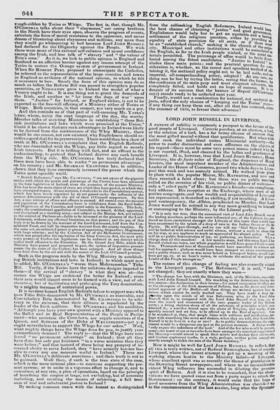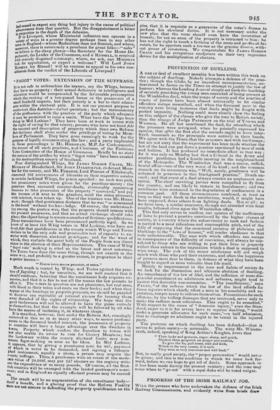LORD JOHN RUSSELL IN LIVERPOOL.
A PATENT of nobility is commonly a passport to the favour of the good people of Liverpool. Ceeierts paribus. at an election, a lord or the relation of a lord, has a far better chance of success than the most gifted mortal without that qualification. But when with noble rank the individual unites Ministerial authority—the power to confer distinction and even affluence on the objects of his regard—there must be some very potent reason indeed why be is not courted, feted, and cheered by the ladies and gentlemen of Liverpool. It is, however, true that Lord JOHN RUSSELL, Home Secretary., the de facto ruler of England, the dispenser of Royal favours, the most important member of the Administration, and Leader of the House of Commons, passed two whole days in Liver- pool this week and was scarcely noticed. He walked from place to place with the popular Mayor, Mr. RATHDONE, and now and then received a faint cheer; but there was no public meeting called on the occasion of his visit, no public dinner of welcome— only a "select party " of Mr. RATHBONE'S friends—no complimen- tary address. His reception at the Exchange, where men of all parties congregate, and the wealth and respectability of Liverpool are represented, is described as chilling, if not insulting. A Liver- pool contemporary, the Albion, prophesied on Monday, that Lord JOHN would not be noticed in any way more gratifying to himself or encouraging to the Ministry, by the Liberal party- " It is only too true, that the announced visit of Lord John Russell, one of the leading members, perhaps the most influential one, of the Cabinet, has pro. duced no more excitement amongst the Liberals of this town than would have been occasioned by the splash of a drop of rain in the Indian Ocean or the far Pacific. Ile will pass through, and no one will say God bless him.' He will be looked at with solemn and awful silence, without a smile to cheer his on his way, or any applause to mark an approval of his altered policy. There will be no public demonstration of joy, no gathering, no festivities. What a change does all this mauifest! A few months since, had this same Laid Joha Russell visited our town, our whole population would have poured forth to meet him. Thousands and tens of thousands would have assembled to witness and hail his approach : gladness would have been stamped on every countenance; and a public dinner, such as was never beheld in Liverpool before, would have been got up, ay, at an hour's notice, to celebrate the arrival of the popular Leader of the People amongst us."
The causes of this change of feeling are also correctly stated in the Liverpool paper. "The Reformers," it is said, " have not changed; they are exactly where they were--
" The change has been with the Ministers, and, of the Ministers, especially with Lord John Russell himself. His truckling to the Aristocracy during the late session—his declaration in their favour—his actual resignation of office, not as the champion of the Irish measures of Reform, but as the fierce and 1.ter- mined opponent of the Ballot—all these things are written against him in
i letters which cannot be easily washed out. They have made a deep m-
Mission upon the minds of all true Reformers, who, in the Lord John Russell that is, as compared with the Lord John Russell that seas, see at once the wreck and monument of the once popular leafier of the Refine party ; a living skeleton shorn of all the substance of principles which once adorned it; a sacrifice bound upon the altars of Toryism, and ready, if not speedily rescued and set free, to be offered up to the Baal of apostacy. Can it be wondered at, then, that people listen with coldness and inlidfacnce, per. haps with something like scorn and disdain, when they are told, that Lord John Russell is to be here in a day or two? As to public demonstrations, the cape• riaaent would be a dangerous one just at the present moment. A dinner would ' only expose the nakedness of the land.' And of the few who would be present, some—we know of one or two who have been amongst the stanchest suppurteni of the Miuistry—would attend to speak their minds and declare their sentiments, and disclose unpleasant truths, in a style, perhaps, neither polite enough nor courtly enough to tickle the ears of the Home Secretary."
Now it might be well for Lord JOHN RUSSELL to reflect, that all t his is truly written, not of Radical Birmingham, but of courtly Liverpool, where the recent attempt to get up a meeting of the working classes hostile to the Ministry failed—of Liverpool, whose excellent spirit was so recently the theme of gratulation m the Downing Street newspapers, and where to no inconsiderable extent Whig influence has succeeded in diluting the genuine spirit of Reform. And it is also to be remarked, that the obser- vations we have quoted come not from a party eager to attack the Government : on the contrary, it would seem that the hope of good measures from the Whig Administration was cherished SP to the commencement of the last session, long after the Spectator bid ceased to expect any thing but injury to the cause of political advancement from that quarter. But the disappointment is bitter ei proportion to the depth of the delusion. If in Liverpool, where Ministerial influence can operate in a wog of ways in a greater degree perhaps than in any other on in England—where Radicalism does not flourish, and where, moreover, there is notoriously a penchant for great folks—" nobs" we believe is the slang phrase—the Secretary for the Home De- ment Leadr of te Com, a RUSSLL, received 14" sob scarcelythe disguiesed cohntempt;mons where,and we ask.E canis Ministers
look for approbation, or expect a welcome? Will Lord JOHN Hussey. try Stroud? will he venture to appeal to Isis own con- stituents from the verdict of the Liberals of Liverpool ?



























 Previous page
Previous page